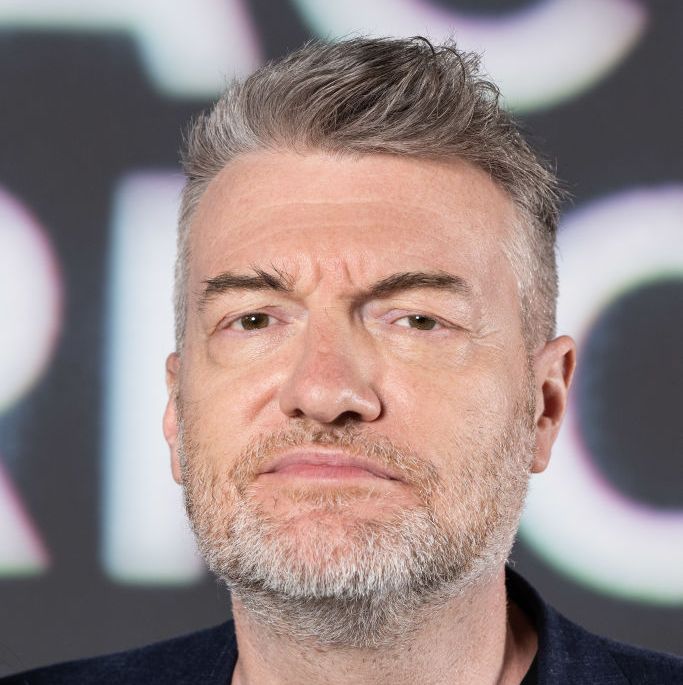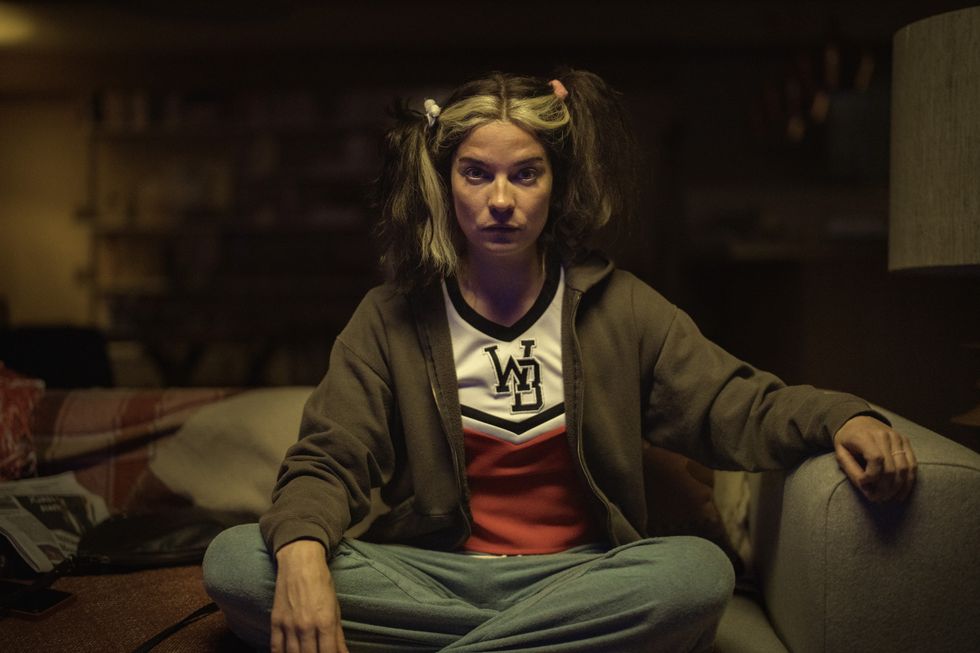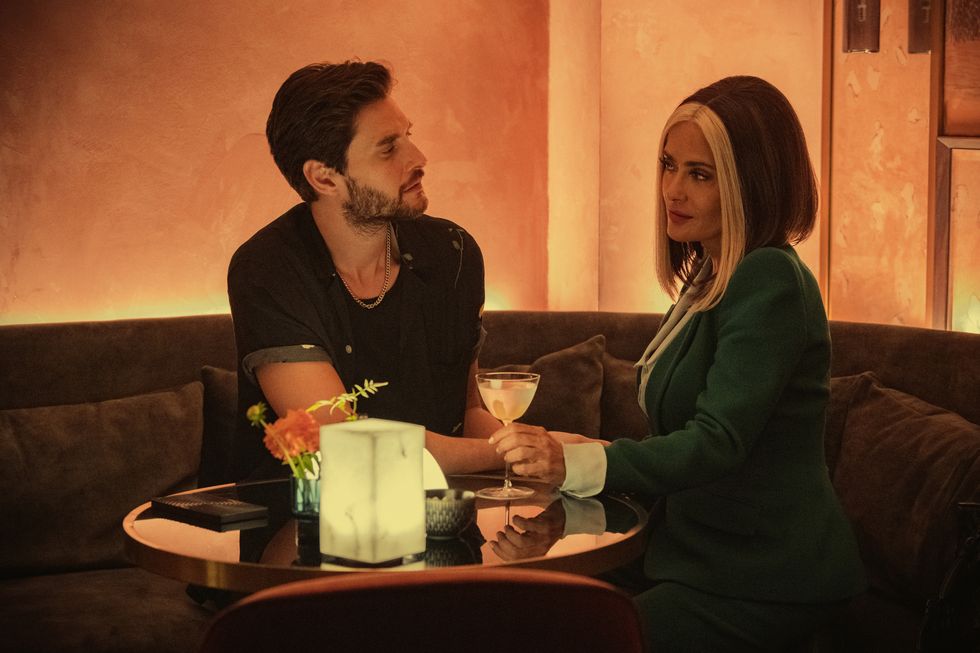In the new season of Netflix's Black Mirror, the CEO of Streamberry, a Netflix-esque streaming service, explains to a journalist why all of their programming is so negative. At one time, they used a more positive angle—mining everyday people's lives for stories and recreating it with digital likenesses of famous celebrities—but it didn't take. People prefer viewing content "in a state of mesmerised horror," the CEO says, which is basically what it feels like to watch Black Mirror itself.
Since its inception, Black Mirror has reinvented itself with every new iteration. It took three seasons for Black Mirror to air its first happy ending in "San Junipero," which became (arguably) the show's most beloved episode. Black Mirror experimented with interactive storytelling in the choose-your-own-adventure story "Bandersnatch," and it created a hologram of Miley Cyrus, who sings a cover of Nine Inch Nails' "Head Like a Hole" in Season Five's "Rachel, Jack and Ashley Too."
The sixth season of the show, streaming now, feels both old and new, an effect born from writer-creator Charlie Brooker's desire to try something different with the format. Savvy viewers may notice that three of the five episodes are set in the past, with seemingly no connection to the on-head-technology/computer contacts/evil app tradition of previous episodes.
"I think there was a danger that Black Mirror was becoming the show about consciousness being uploaded into a little disc," Brooker explains to me over Zoom, a week before Black Mirror's long-awaited return. "If you asked somebody to picture a Black Mirror episode, they picture somebody going, Ooooh, I'm in a computer."
Originally, Brooker planned to make a Black Mirror companion show called Red Mirror, a retro-styled horror anthology with the same storytelling flavour of its predecessor—but light on the bleak futurism. It started with what ended up being the final episode in Season Six, "Demon 79," a 1979-set story about a young woman (Anjana Vasan) who unwittingly makes a pact with a demon (Paapa Essiedu). Eventually, she has to perform human sacrifices to avert a world-ending calamity. Ultimately, Brooker figured, why not just make it all part of the Black Mirror world? "Who says I have to set this in a near-future setting, and make it all chrome and glass and holograms and, you know, a bit Minority Report?" he says. "What happens if I just set it in the past? That opens up all sorts of other things."
The feature-length third episode, "Beyond the Sea," is a Robert Heinlein-esque story following two astronauts (Josh Hartnett and Aaron Paul) as they maintain a space station. The twist? They're able to link their minds to mechanical bodies down on Earth in order to live relatively normal lives with their families. (Coincidentally, the spaceship interior was built on the same Twickenham soundstage The Beatles used to record Get Back.) Brooker was attracted to classic sci-fi, the Helter Skelter period of the late 1960s, and writing a story about people who aren't constantly looking at screens: "They are behaving like characters from the past. They're not behaving like people now. Or, they're not behaving like people whose every thought is processed through their phones."
The fourth episode, "Mazey Day," introduces a paparazzi photographer (Zazie Beetz) navigating the celebrity gossip blogosphere of the mid-2000s, who finds herself hunted by an actress afflicted with the werewolf curse. It sounds more like the plot of a Shudder original than an episode of the evil phone show. "The thing I was trying to do this season is divorce my own mind from what the show is meant to be," Brooker says. "Somebody did say to me, 'Oh, you can do a Black Mirror episode about NFTs.' And I thought, Is that my job now?! So boring."
By the way, Brooker maintains that Black Mirror is not about the wickedness of Big Tech: "Humans are weak is the story, rather than technology is evil, because I love tech," he adds. That sentiment alone transcends the show's traditional near-future milieu. The second episode, "Loch Henry," is set in the present day, following a pair of documentary filmmakers (Myha'la Herrold and Daniel Portman) who plan to give a shocking hometown murder the lurid true crime treatment. "Loch Henry" relies on VHS tapes to build its narrative, instead of a smartphone app or webcam. "It's a weird one, because it is about the archive of the past that people are digging into," Brooker says. "But it is also about the way all that stuff is now hoovered up and presented to you on prestige TV platforms—that we're mining all these horrible things that happened and turning it into a sumptuous form of entertainment."
The only episode that really feels like, as Brooker puts it, "trad Black Mirror," is the first, titled "Joan Is Awful." It's a darkly comedic tale, which deals with the uncomfortably close (and very possible) future of streamers with catalogs full of AI-generated content. Annie Murphy plays a digital media CEO who turns on her TV one night to find that her favourite app, Streamberry, has used her personal data to dramatise everything she did that day—making her look, well, awful.
"We wrapped shooting just before ChatGPT was launched," Brooker says, acknowledging that "Joan Is Awful" is eerily timely—even by Black Mirror's standards. He originally wanted to write a story about a news network using deepfake footage of politicians doing terrible things to get views, and another about some Average Joe discovering they've made national headlines for doing something totally innocuous: "No major transgression. People don't like the way she walks, or whatever," he says. It was while watching Hulu's Elizabeth Holmes drama The Dropout with his wife that Brooker figured out his angle: "We were going, 'Oh, it feels like it was dramatising things that happened ten minutes ago.'"
Brooker says that Murphy and her co-star Salma Hayek, who plays the fictional "Joan" on the show-within-the-show, offered input about the very real digital spectre looming over everything in entertainment. "This is stuff that's absolutely on their minds at the moment," he explains. "As writers, the thought that we could end up soon with automatically generated entertainment that is endlessly targeted directly at individuals is horrifying. I'm pleased with how timely it is. If it came out in six months' time, everyone would go, 'Well, that happened two weeks ago. I'm not gonna watch that. I'm busy watching Ryan Is Awful.'"
This season may feel different, but Brooker insists that Black Mirror's "chocolate box" nature allows the show to try on as many different hats as Brooker feels like writing.
"I'm probably confounding all sorts of fan expectations," he says. "And I'm talking about the hardcore fans. You want to confound expectations, but also you want to give people what they want. And one thing that people do want from Black Mirror is to feel a horrible sense of dread. We've definitely delivered on that front."
Rest assured, Black Mirror still courts all the die-hards—the ones who chart each Easter egg that pops up in every episode. For example, a previous draft of "Joan Is Awful" had the rest of Season 6's episodes on the Streamberry landing page, as if everything you were about to watch was a TV show from the "Joan Is Awful" universe. "It's the same psychological universe but not necessarily physically connected," Brooker explains I when ask whether there's a grand, unified Black Mirror timeline out there. "Neighbouring multiverses? I don't know what you'd call it. But I don't sit there with a passion wall like that meme image with the guy from Always Sunny. It's mainly a bit of fun. But it's also a fun thing when you're writing to connect the dots, even if the dots don't actually connect."
Brooker was happy to return to Black Mirror, even in These Uncertain Times, when everything seems dour and depressing, because of the excitement of trying something new. "It was a refresher," he says of this season's throwback vibe, while keeping the spirit of the show alive. "There's generally some downers and there's some bitters; there's some bleak and bittersweet and happy endings." He's also very conscious of the time-suck that so much of today's linear television demands, forcing viewers to sink ten or more hours into something that may or may not pay off. How nice, then, that Black Mirror offers—he hopes—a little something for everyone?
"There's nothing more frustrating than when you're watching a true crime documentary, and it starts to dawn on you somewhere around Episode Three: They're not going to tell me who did this," Brooker grumbles. "It's going to end with them going, 'Isn't it interesting that no one really knows what the truth is?' Not what I want. I want to see an interview with the killer. Go and generate one on ChatGPT."















